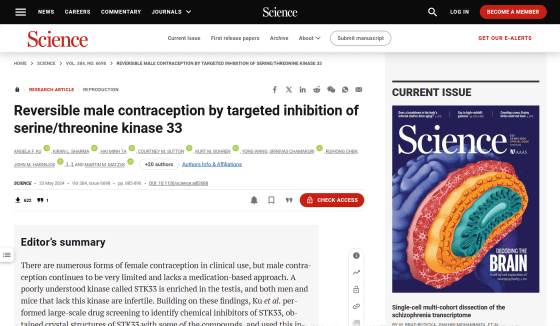A breakthrough in male contraception that safely turns off sperm function and easily restores fertility is reported

While there are many options for contraception for women, such as oral contraceptives (the pill), female condoms, and intrauterine devices (IUDs), most contraception for men is limited to condoms, and most other methods are irreversible, such as
Reversible male contraception by targeted inhibition of serine/threonine kinase 33 | Science
https://www.science.org/doi/10.1126/science.adl2688

A promising approach to develop a birth control pill for men | ScienceDaily
https://www.sciencedaily.com/releases/2024/05/240523153614.htm
Male birth control breakthrough safely switches off fit sperm for a while
https://newatlas.com/medical/male-birth-control-stk333/
To develop a male contraceptive, a research team at Baylor College of Medicine turned their attention to mutations in a gene called selenium/threonine kinase 33 (STK33) . STK33 is a protein abundant in the testes and has been shown to be important for producing functional sperm. However, genetic mutations in STK33 can lead to infertility due to abnormal sperm and reduced motility.
'Researchers have investigated several strategies to develop male contraceptives, but there are no male contraceptives yet,' said Dr. Martin Matzuk , co-author of the paper and director of the Center for Drug Discovery at Baylor College of Medicine. 'In this study, we turned to a novel approach: identifying small molecules that inhibit STK33, a protein required for reproductive function in humans and mice.'
The researchers found that mice and human males with the STK33 mutation showed no other defects besides impaired sperm function, and no abnormalities in testis size, making inhibition of STK33 a promising safe and viable option for male contraception.

To find specific STK33 inhibitor candidates, the team screened
To test the efficacy of CDD-2807, the research team tested its effectiveness in mice. The research team evaluated the dosage and treatment schedule of CDD-2807 in mice and investigated the motility, number, and fertilization ability of mouse sperm.
The results showed that CDD-2807 crossed the blood-testis barrier , acted on STK33, reduced sperm motility and count, and effectively reduced fertility even at low doses. In addition, no other side effects were observed in mice treated with CDD-2807.
'We were pleased to see that the mice showed no signs of toxicity from CDD-2807 treatment, that the compound did not accumulate in the brain, and that treatment did not change testis size,' said Courtney Sutton , a postdoctoral researcher and co-author of the paper. 'Importantly, the contraceptive effect was reversible: after a period without CDD-2807, the mice's sperm regained motility and count, and they were once again able to fertilize.'

'This study is still in mice, and more research is needed to see if CDD-2807 works in humans. Matsuku and his colleagues plan to evaluate CDD-2807 and similar compounds in primates to determine their effectiveness as a reversible male contraceptive.'
Related Posts:
in Science, Posted by log1h_ik







